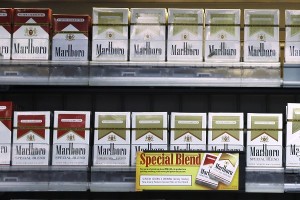‘Sin’ tax collection up 61% in 8 months

Collection of taxes from manufacturers of cigarettes and alcoholic beverages surged in the first eight months of the year, boosted by the higher tax rates that have so far failed to dampen consumption of these so-called “sin” commodities. AP PHOTO
Collection of taxes from manufacturers of cigarettes and alcoholic beverages surged in the first eight months of the year, boosted by the higher tax rates that have so far failed to dampen consumption of these so-called “sin” commodities.
Based on a report from the Department of Finance, parent agency of the Bureau of Internal Revenue (BIR), collection of excise tax on cigarettes and alcohol reached P56.3 billion from January to August, up 61 percent year on year.
“An encouraging note has been the success of our ‘sin tax reform’ as a revenue measure,” Finance Secretary Cesar Purisima said in the report.
Of the amount, the bigger share of P35 billion was accounted for by excise tax payments by cigarette makers. The amount marked an annual rate of increase of 77.7 percent.
Excise tax payments by manufacturers of alcoholic beverages amounted to P21.3 billion, up year on year by 39.6 percent.
Article continues after this advertisementThe higher collection was made possible by the Sin Tax Reform law, which took effect in January this year. The law raised the excise tax rates for so-called sin products and mandated the gradual shift to a unitary tax rate over the medium term.
Article continues after this advertisementThe law is targeted to increase the BIR’s sin tax collection by P33.9 billion this year to P85.86 billion.
Internal Revenue Commissioner Kim Henares earlier expressed confidence that the target would be achieved given the favorable collection performance so far in the year.
The impact of the law on the BIR’s revenue collection was not substantial earlier in the year because of overstocking, officials said. In particular, manufacturers produced more cigarettes and alcoholic beverages toward the end of last year and kept the excess goods in their warehouses to temporarily avoid paying the higher taxes (the excise tax is paid upon withdrawal from manufacturing plants).
But officials said the full impact of the law was already felt in the second half of this year because old inventories of cigarette and alcoholic beverage manufacturers have already been depleted.
The substantial increase in the collection of sin taxes also came with observations that consumption of cigarettes did not significantly decline even with the higher tax rates.
Industry data showed that average consumption of an individual smoker stood at 14.13 sticks a day in the second quarter, only marginally lower than the 14.84 sticks registered in the same period last year.
This means that while the Sin Tax Reform law is so far achieving the government’s revenue targets, it is hardly meeting the other goal of reducing smoking incidence.